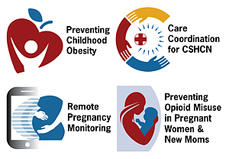
HRSA Administrator Congratulates Leadership Program Graduates
 |
Our Administrator, Dr. George Sigounas (far right), congratulated the 2018 graduates of the agency’s Mid-Level Leader Development Program on Monday, July 16. HRSA offers training along a continuum – from aspiring managers to senior leaders – in an effort to build a next generation workforce from within.
National Health Service Corps Launches New Website
 Keep up-to-date with the Corps! HRSA's new National Health Service Corps (NHSC) website features a user friendly, enhanced design, so you can quickly find information about our programs... and with fewer clicks! Improvements include:
|
MCHB Launching Obesity Challenge
 | We need your innovative idea to improve the health of moms and kids! On Monday, July 23, MCHB Grand Challenges will launch the Using Technology to Prevent Childhood Obesity Challenge. This competition will award $375,000 in prizes to support the creation of solutions to empower low-income families to achieve healthy eating practices and healthy lifestyles. |
HRSA Study Finds Low Rates of Developmental Screening in U.S. Kids, Wide State Variation
 July 9: Research published in JAMA Pediatrics found that in the past year, fewer than 1 in 3 young children had received a parent-completed developmental screening from a health care provider. Universal screening and surveillance promote early diagnosis, intervention, and outcomes for children with developmental delays and disabilities. Wide variation across states, ranging from about 17% in Mississippi to nearly 60% in Oregon, indicates that systems-level quality improvement efforts can boost rates. Led by HRSA researchers, the analysis used 2016 data from HRSA’s National Survey of Children’s Health. |
HRSA Study Finds 1 in 4 Children and 1 in 5 Adolescents are Bullying Victims
 Recent data show that 24 percent of children ages 6 to 11 are bullying victims, slightly higher than the 21 percent of adolescents ages 12 to 17 who are bullied, according to reports from their parents. This study analyzed data from HRSA’s 2016 National Survey of Children’s Health to provide estimates for children as young as 6 years. Children with language disorders were 65 percent more likely to be bullied; children who used technology more than 3 hours per day were 37 percent more likely to be bullied; and children with two or more emergency department visits in the past year were 72 percent more likely to be bullied. Additionally, adolescents with autism were 56 percent more likely to be bullied. Among both children and adolescents, those with special health care needs, anxiety or depression, and behavioral/conduct problems were more likely to be bullied. Results highlight the need to begin bullying prevention efforts at young ages and to address the needs of youth at greatest risk. Findings also reveal the need for training for adults in frequent contact with children and adolescents. |
HRSA Issues Hurricane Resources for Children with Special Health Care Needs
 In collaboration with the HHS Office of the Assistant Secretary for Preparedness and Response, HRSA has developed a collection of resources informing hurricane response and recovery for families, organizations, and clinicians caring for children with special health care needs. The hurricanes of 2017 – notably Harvey, Irma, and Maria – illuminated the importance of ensuring children and their families stay connected to necessary services during emergencies. This is especially true for children with special health care needs, who often need attention and support beyond what children typically require. The resources complement guidance provided by state and/or local authorities, which may have more information about location-specific activities and services. |
Women and Diabetes: A Coming Pandemic?
 Women are at special risk of developing diabetes. It can strike mothers-to-be, and even their unborn children -- and its presence elevates the risk of heart problems, according to a recent webinar co-hosted by HRSA's Office of Women's Health and Office of Regional Operations Region 7 in Kansas City, MO. Statistics tell a stark story: Nearly one in three American women have heart trouble. And those diagnosed with diabetes are twice as likely to have a heart attack -- with three times the probability they'll die from that heart attack compared to women without diabetes. There is also good news: sustained attention to one's diet and regular exercise can reduce and eliminate those and other serious risks, health and wellness expert Yasmine Simmons said. This Month
July
Funding OpportunitiesHealth CentersService Area Competition - Apply by August 6 Service Area Competition - Apply by August 15 Service Area Competition-Additional Areas (SAC-AA) – Chicago, IL and Toledo, OH - Apply by August 17 Service Area Competition - Apply by August 20 Health WorkforceNSL Graduate - Apply by July 30 NSL Baccalaureate - Apply by July 30 HPSL Pharmacy - Apply by July 30 Children’s Hospitals Graduate Medical Education (CHGME) Payment Program - Apply by August 17 HIV/AIDSRyan White HIV/AIDS Program Part A HIV Emergency Relief Grant Program - Apply by September 21 AIDS Drug Assistance Program (ADAP) Emergency Relief Funds (ERF) - Apply by September 21 Maternal & Child HealthExpansion of the Family-to-Family Health Information Centers - Apply by July 19 Screening and Treatment for Maternal Depression and Related Behavioral Disorders Program - Apply by August 6 Newborn Screening State Evaluation Program - Apply by August 8 Infant-Toddler Court Program - Apply by August 13 Pediatric Mental Health Care Access Program - Apply by August 13 Rural HealthRural Communities Opioid Response Program - Planning - Apply by July 30 Rural Communities Opioid Response Program - Technical Assistance - Apply by August 10 |






















.png)









No hay comentarios:
Publicar un comentario